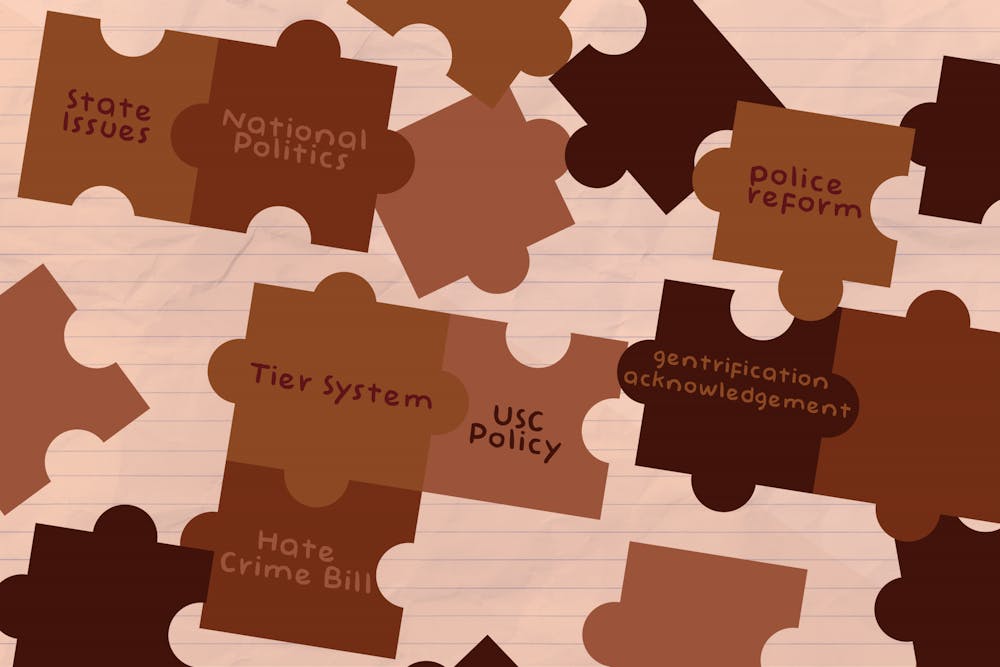Na'Kiya Tye was chairwoman of the powers and responsibilities committee when one of the senators on her committee told her that her roommate offered to "go Klu Klux Klan" on a senator. She said that when she reported it to housing, she was told there was nothing they could do. Hearing about this encouraged Tye to seek out new ways to hold students accountable for racism on campus.
Former student senators Tye, Kayra Rice and Courtney McClain all passed legislation recommending action be taken on the national, state and university level against racism and discrimination within the 114th student senate.
Tye, a fourth-year political science student, sponsored legislation to add consistent definitions of protected class, racism and group assault to the university policy and handbooks.
She also co-sponsored a piece of legislation with Rice recommending that the university employ a three-tiered system of reprimand for students, staff and faculty who have committed prejudicial actions. Each tier getting progressively higher consequences for more offensive conduct.
“I really came up with it because I saw that there was a disparity between the punishments that people got for things like academics versus situations that we have that are based off of race, and there is a lot of racism on campus," Tye said. "It's just not really brought up.”
Tye said she thinks all of the bills are important, in part because she originally wanted to recommend a bill about hate crimes but could not. USC is a public university, meaning the student senate follows the precedent of the state, and South Carolina does not have a hate crimes bill.
“If we want to make real change — like if I wanted to have a hate crime bill anywhere near here — it would have to be something South Carolina, as a state, has," Tye said. "I feel like any legislation where we can affect the state will also come back to affect USC specifically.”

The other bill cosponsor, senator Rice said she was inspired by her time working as a multicultural assistance peer program coordinator in the Office of Multicultural Student Affairs to work on the legislation dealing with prejudicial actions by students, faculty or staff.
"Na'Kiya and my main goal for writing the legislation was to hold people accountable for racism and discrimination on campus... in addition our desire to be a transformational change agent through social justice," Rice, a third year political science student, said via text.
Current speaker of the house, Cameron Eubanks hopes to put less emphasis on national-focused bills and more on feasible legislation.
“We're really trying to have students actually have legislation that the faculty members can take and act on. I think national and state government issues like that are not as effective legislation as things that directly impacts the student walking on this campus,” Eubanks said.
McClain, the chairwoman of the Inclusion and Equity Committee for 114th student senate and a student activist, passed bills centered on state and national politics in February.
“At one point, (national issues) were local, and then they grew, and then they grew, and then they grew. National issues affect students every day,” McClain, a fourth year broadcast student, said.
One of McClain’s other bills urges reform within law enforcement in response to the murder of Tyre Nichols. The bill calls for the George Floyd Justice in Policing Act to be passed and signed into law, that the USE-OF-FORCE database created by the Federal Bureau of Investigations be made mandatory for all U.S. Police Departments to report to and that the use of civil forfeiture and qualified immunity be reformed.
McClain also authored a bill to urge USC’s administration to request the 2023 South Carolina General Assembly vote on the repeal of the Heritage Act, which currently prevents USC from renaming buildings named after controversial figures.
Another bill calls on the university to address racism and bigotry against students of color at USC by examining the curriculum focused on African-Americans, expediting the process to report incidents of racism, and providing students with free therapy who experience race-based trauma.
She hopes to address racism and bigotry at USC by expediting the reporting and support process and acknowledging the gentrification of black neighborhoods from campus development. As for what type of legislation the student senate should focus on in the future, McClain thinks it is important to address national and state issues along with university-specific issues.
The university has yet to act on any of the antiracist bills McClain passed.
All of Tye, Rice and McClain’s bills passed the student senate, but the three senators are graduating this year. Whether the 115th student senate will move away from national and political legislation remains to be seen.

